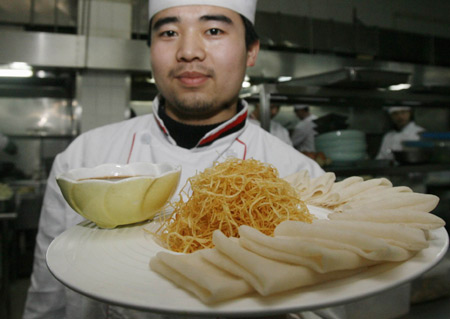GM foods piled on shelves, labeling called upon
Although the typical Chinese kitchen is now likely to have many food ingredients that have been genetically modified (GM), awareness of the issue remains poor among the public, the latest online survey has found.
|
|
|
A chef displays a dish made from genetically modified potatoes in Wuhan, Hubei province. [Photo/Joe Stephen] |
More than 55 percent of the nearly 1,000 respondents said they had scarce knowledge of GM food, the survey conducted by China Daily and Sohu.com showed last week. At least 52 percent said they were unaware of the prevalence of GM food in their lives.
"Genetically modified products such as papaya, soybean oil, tomatoes and potatoes have been largely available in the country's market since early 2000," said Professor Jiang Gaoming of the Chinese Academy of Sciences' Institute of Botany.
As these products are relatively cheaper than non-GM food, people are eating them without being aware of what they are consuming, he said.
A survey conducted by Greenpeace China last year showed a large majority of the papaya sold in major Chinese cities like Beijing and Shanghai was genetically modified.
"Worse, they are not labeled," Fang Lifeng, spokesman of Greenpeace China's GM program, told China Daily Wednesday.
In the latest survey, 73 percent of those polled said they would check the GM status of products while shopping for food, while nearly 67 percent said they were unsatisfied with the current level of GM labeling.
"When I shop for soy oil, I always find it hard to spot the GM label, which usually appears in small print," said food safety-conscious Wang Yi, 31, a white-collar worker in Beijing.
Relating that her mother is unaccustomed to checking on the status of GM food, Wang added: "For her, price is the top concern when choosing food."
China leads the world in public biotech crop research, experts said.
GM crops in the field trial stage include rice, wheat, corn, soybeans, potatoes, cabbage and tobacco. GM cotton also accounts for 30 percent of the country's cotton acreage, official statistics showed.
Under such circumstances, public awareness of GM food should be largely improved, particularly its potential negative impact on health and the environment, Fang urged.
"Despite the relatively lower price of GM food, people should be equipped with the knowledge, both positive and negative, when choosing what to eat," he said.
Internationally, advocacy groups have strongly opposed GM technology being put in the human food chain, citing its unforeseeable impact.
Studies also found GM food damaged laboratory rats fed with these ingredients.
In response to food safety and health concerns, nearly 88 percent of those polled said they would choose traditional food over the GM variety, the latest survey showed.
However, Yang Xiaoguang, a food nutrition expert with the Chinese Center for Disease Control and Prevention, thought otherwise.
"GM food is safer than ordinary food in terms of pesticide residue," he explained.
GM plants are often created to resist disease and eliminate the need for pesticides. Their perceived advantages, such as a hardier texture, higher nutritional value and faster growth, create a type of "superfood," studies showed.
 0
0 







